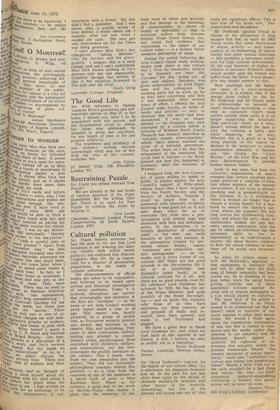Sir: David Holbrook's concern for the health of our culture
(May 13), is admirable, his diagnosis however less SO. in the past his eye has often liken lured by the dazzle of chromed motorcycle tailpipes and ,other facetsof his symbolic .demonology, but few of the ,demoni are causes and not all that
many are significant effects. This is also true of his latest eort, ' Permissiveness and decadence.
Mr Holbrook ignores Freud in favour of his detractors: it thus escapes him that as early as 1905 Freud wrote that some restrictions of sexual activity — and consequently of re-channelling of sexual energy into other mental functions — was probably a necessary condition for high cultural achievement. At the cost however of higher incidence of neurosis. Primitive tribes would neither gain the former nor suffer from the latter. Freud doesn't give any simple answer to this.
Now marriage and the family are units of a socio-economic structure. It is evident that if the sexual drive (which by the by, Mr Holbrook and Dr Unwin seem to acknowledge en passant as man's strongest motivation — else why so culturally vital?) finds outlets outside these units it is no longer supporting the structure. That particular water, as it were, doesn't remain behind the dam to give the turbines a hefty spin while departing on its way. Whether this is a good or a bad thing depends on the values enshrined in the structure to whose maintenance sexuality is harnes sed. One recalls the " Little Mother" of the First War and her stoic determination to provide human cannon fodder.
Such, in any case, has been the collective organisation of man's energies that certain societies have today achieved a complex civilisation whose mastery of the natural mvironment, if not total, is already crushing and is geometrically on the increase. It is a civilisation where a woman no longer has to choose a strong hunter for a husband to ensure her family's survival. where. the woman's life will long outrun her childbearing functions; and where the early onset of adolescence widens the gap between sexual maturation and the age by which an individual has the necessary skills to live independently in so sophisticated a society. All these factors combine to float the sexual element of marriage off its social and economic basis.
So when Dr Unwin states — with Mr Holbrook's approval — that monogamy is basically OK, and will be ideal once the little snag of female inequality has been ironed out, he is speaking in utopian terms, since the social forces pulling towards one of these desiderata militate against the other and to impose monogamy as a rule would plainly be ludicrous.
The main fault of the article is that Mr Holbrook is so firmly homed in on premarital sex that he doesn't seem to conceive of our social malaise in other than sexual terms. We would I think agree about the commercial exploitation of sex, but this is rooted in commerce and the media rather than inherent in our sexuality and Mr Holbrook doesn't appear to question the rightness of expressing this sexuality within the present framework. Maybe "the present extension of sexual opportunity" could Also " undermine our culture and energy two generations • ahead." Maybe a little wind out of the sails wouldn't be a bad thing and maybe the way our GNP
orientated resource-squandering civilisation is headed, two generations will be none too soon.
Stephen Thorn 504 King's College, Cambridge








































 Previous page
Previous page